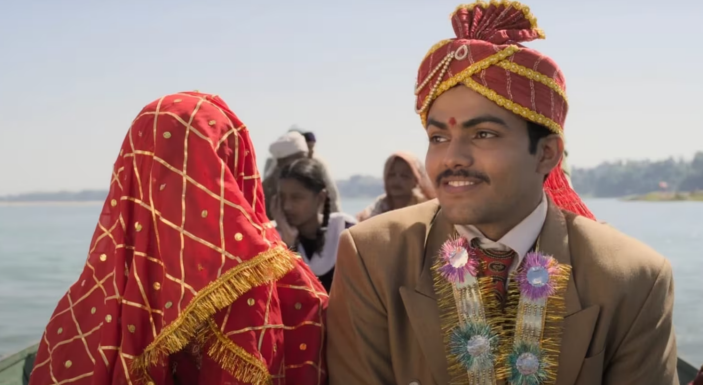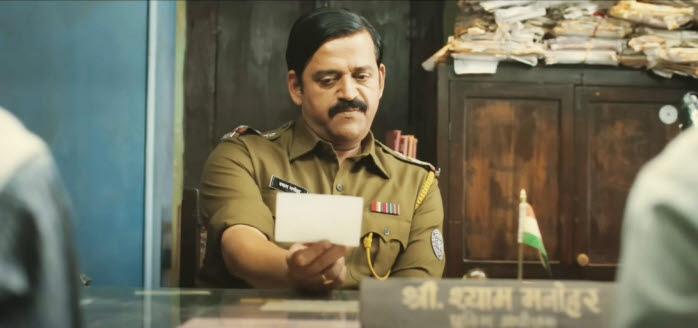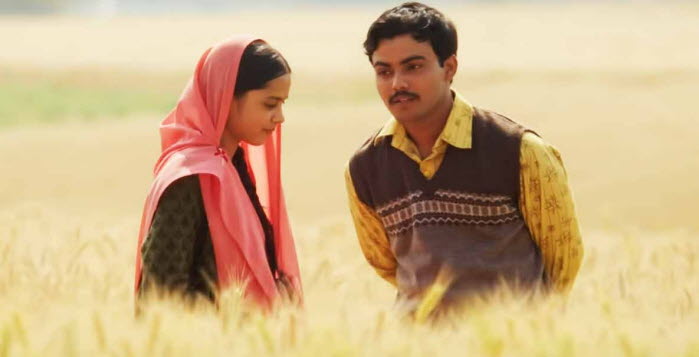Indian film “Laapataa Ladies”, which was recently shown at the Jeonju International Film Festival in South Korea, is an entertaining mix of comedy, drama, and a bit of wholesome feminist message. Starting from one absurd comic situation involved with mistaken identity, the movie deftly swings back and forth between humor and poignancy, and it surely earns its feel-good ending as making us like and care more about almost everyone in the story.
The movie, which happens to be set in 2001, opens with a little wedding ceremony being held in one small rural village. Although they got to know each other a bit only for a rather short time, Phool (Nitanshi Goel) and her groom Deepak (Sparsh Shrivastav) are hopeful about their married life, and we soon see this young married couple leaving her village and then traveling to Deepak’s hometown village by a train right after the end of their wedding ceremony.
Because it is incidentally some traditional holiday when a lot more couples marry than usual, Deepak and Phool happen to sit along with two other recently married couples, and we cannot help but notice how Phool and the two other brides do not look that different from each other as they are covering themselves with the same kind of veil. When the train arrives at his village at late night many hours later, Deepak hurriedly gets off from the train, but, alas, he wakes up one of those two other brides instead of Phool, and he belatedly comes to realize his mistake when she finally reveals herself in front of him and his family, who are all quite shocked and baffled to say the least.
Deepak and his friends naturally go to a local police inspector for requesting some help, but they do not have any clue about where the hell Phool is. Moreover, the inspector is not particularly eager to help them because the case does not seem to benefit him at any chance, though he senses something fishy about that other bride during their subsequent meeting.
That other bride, who says her name is Pushpa (Pratibha Ranta), simply decides to stay at Deepak’s family house for a while, and it gradually turns out that she does have some hidden purpose behind her back. While she pretends that she does not know how to contact with her family or her groom, she actually has a cellular phone, and we see how she prepares for her hidden plan step by step without telling anyone while also closely monitored by the aforementioned inspector.
Meanwhile, the movie shows us how the situation is equally baffling for Phool, who finds herself helplessly stranded alone in the train station of the village where that other bride was supposed to go. She could just simply go with that other bride’s groom, but it is quite apparent to her (and us) that he is not a very good person at all, and she has no choice but to stay alone at the station for a while at least.
While generating some suspense in the story at times, the movie leisurely rolls its plot and characters with genuine care and affection. While it pays some attention to Deepak’s earnest efforts for finding his bride, the movie also focuses on how Pushpa positively influences Deepak’s family members in one way or another, and there is a small touching moment when she sincerely encourages one certain female family member’s considerable artistic talent. In case of Phool, she comes to go through some substantial growth and maturation via several generous figures willing to help her more than expected, and it is poignant to observe how much she is changed in the end even though her affection toward her groom remains same as before.
Needless to say, the movie eventually shifts itself toward melodrama later in the story, but it thankfully avoids unnecessary sappiness while making a clear point on female rights. While Phool and Pushpa are quite different from each other in many aspects, they are all active and independent in their contrasting life choices nonetheless, and you will certainly root for them more around the end of their individual journeys. In addition, the movie surrounds them with a number of various colorful female characters to remember, and I particularly like Manju Maai (Chhaya Kadam), a no-nonsense street vendor lady who teaches a bit of self-taught feminism to Phool after reluctantly taking her under her wing.
The movie is often buoyed by the engaging performances from its several main cast members. While Nitanshi Goel and Pratibha Ranta ably support the film from their opposite positions, Sparsh Shrivastav is sympathetic as another crucial part of the story, Chhaya Kadam and Ravi Kishan delightfully steal the show during their respective key scenes. As the aforementioned inspector, Kishan is hilariously sleazy with a moustache to twirl, and he is also effective when his character unexpectedly shows some decency and principle around the end of the story.
“Laapataa Ladies” is the second feature film from director/co-producer Kiran Rao, who made a feature film debut with “Mumbai Diaries” (2011) and then has produced several successful commercial films including “Dangal” (2016) during next several years. I have not seen “Mumbai Diaries” yet, but I can tell you instead that “Laapataa Ladies” is a competent crowd-pleaser packed with enjoyable goodies including the good soundtrack by Ram Sampath, and I think you should give it a chance someday.










